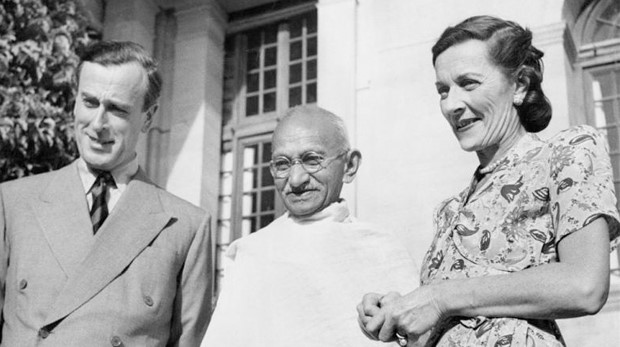Meetings that made history… When Gandhi met Lord Mountbatten
The last Viceroy of India, Lord Louis Mountbatten, and Indian lawyer and anti-colonial campaigner, Mahatma Gandhi, had a mutual respect for each other – even though their views could not have been more different, with them being at opposite ends of the political spectrum.

Early careers
As a former British Royal Navy officer and the 1st Earl Mountbatten of Burma, Lord Mountbatten represented colonialism and everything that Gandhi opposed in a political sense, but although their relationship was initially strained after Mountbatten was appointed Viceroy of India on 20th February 1947, they came to respect each other’s achievements as human beings, regardless of their political beliefs.
Mountbatten was a second world war veteran, with a distinguished military career behind him, when he was sent to India at the age of 47 to oversee the smooth transition of British India to independence by 30th June 1948.
Gandhi had studied law in London in his youth. By the time colonialism was coming to an end, he was a 77-year-old peace campaigner, who urged non-violent resistance to the British rule of India. He inspired not only the Indian people to call for independence, but also campaigns for freedom and civil rights across the world.
Before their momentous meeting, Mountbatten had written privately that the Indian politician and former president of the Indian National Congress was “unpredictable”. In fact, early in 1947, Mountbatten wrote a private report in which he claimed Gandhi was promoting “dangerous propaganda”.
Famous meeting
However, when Gandhi met Lord Mountbatten to iron out the process of the transition from British rule to independence, they got on surprisingly well and ended up having great mutual respect for each other.
It was reported that they first met in 1947 over a cup of tea, with the viceroy’s wife, Lady Edwina Mountbatten, also in attendance. Gandhi and Mountbatten paved the way for independence, which had to be delivered by 30th June 1948.
Mountbatten’s view of the inspirational Indian politician changed considerably during the course of their relationship. He developed a genuine affection for Gandhi and despite Mountbatten’s exasperation on occasion at the way the talks were progressing, he couldn’t hide his admiration for his counterpart.
Gandhi’s death
Their collaboration resulted in India gaining its independence by 15th August 1947, ten months before the deadline that Mountbatten had been given. He went on to describe Gandhi as someone who would “go down in history on a par with Buddha”.
Sadly, their close working relationship was to end almost as soon as it had begun. Gandhi was assassinated just five months later, on 30th January 1948, in the garden of his home, Birla House, in New Delhi, when Nathuram Godse shot him in the chest at point-blank range.
Godse was a Hindu nationalist from Maharashtra, who claimed Gandhi had favoured the political demands of the Muslims during the Indian independence talks. The killer was sentenced to death for his crime.
Mountbatten was shocked by the assassination and paid a moving tribute to Gandhi. Speaking publicly after his death, Mountbatten said his friend would go down in history as a great leader.
Prince pays tribute
Two decades later, Mountbatten’s great-nephew Prince Charles paid tribute to Gandhi in a celebration of his life at the Royal Albert Hall in London in 1969. Gandhi died before Charles was born, but the prince recalled many anecdotes that Mountbatten had told him.
The prince said that Louis and Edwina Mountbatten had married in 1947, just before the Indian independence process began. Gandhi was one of the first people to congratulate them but asked their forgiveness for not sending a wedding present.
He said it was because he had no possessions of his own, having denounced them all for his religious faith. Mountbatten suggested that Gandhi might make a small gift instead, so the Indian politician set to work on his spinning wheel and made them a decorative tablecloth! When the British Museum asked the royal family if they could borrow the tablecloth for their exhibition of Gandhi’s life, it was produced from the Queen’s personal collection of treasured items.
Prince Charles concluded that even though he didn’t know Gandhi personally, he had heard so much about him from his great-uncle that he was happy to speak in tribute to the man who had achieved “astonishing” things for India.
He spoke of how fortunate India had been to have such a man masterminding the transition from colonialism to independence – something Charles described as “one of the most critical periods” in the nation’s history.
Terrorist attack tragedy
At the age of 79, Lord Mountbatten lost his life in a terrorist attack – he was assassinated on 27th August 1979. He was killed by an IRA bomb planted on his boat, Shadow V, when it was moored at Mullaghmore in Ireland.
On the 40th anniversary of his death, the great politician and military man is being remembered in a new BBC documentary examining his life and tragic death. His momentous meeting with Gandhi is one which shaped history and will never be forgotten.
Although not every meeting will have consequences that change history, &Meetings can surely give you the best start by providing the perfect venue – the rest is up to you! Give us a call on 0800 073 0499 to take advantage of our affordable meeting rooms.
Share this post
Tags
- Career Development
- Celebrity Meetings
- Conferences
- Confidence
- Exhibitions
- Historic Meetings
- How to Interview Effectively
- Human Resources
- In The Press
- Meetings and Conferences
- Monarchy
- News
- Our Team
- Personal Development
- Personnel
- Presentation Techniques
- Teamwork
- Top Tips for Meetings
- Training & Workshops
- Video Conferences



